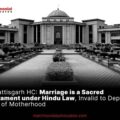
The case being heard by Justices Goutam Bhaduri and N.K. Chandravanshi involved an appeal made by a husband who had filed a petition for divorce under Section 13(1)(i-a) of the Hindu Marriage Act, 1955. The husband had previously been married and divorced from his first wife, but remarried to a woman named P. Padmavati in order to secure a future and provide a child for his son. Prior to the second marriage, the husband underwent a vasectomy to prevent any future children, which the wife also agreed to in order to accept the son from his previous marriage as their only child.
Two years into their marriage, the wife expressed a desire to have a child, but the husband objected and put pressure on her to not have one. This led to the son being subjected to torture. However, the wife continued to pursue having a child and underwent IVF using eggs and sperm from outside donors. The husband claimed that he had offered to donate his sperm but the wife used an unknown donor’s sperm instead. The wife became pregnant through the IVF treatment and underwent a procedure to remove an extra embryo, resulting in the birth of twin daughters.
As a result of the IVF treatment and the birth of twin daughters, the home environment became increasingly hostile. The wife made sarcastic comments in front of friends about the husband’s inability to give birth to a child, causing the husband to feel mentally abused and subjected to cruelty. Due to these circumstances, the husband believed that he had grounds for divorce as they could no longer continue their relationship.
The bench was considering whether to intervene in the order passed by the Family Court. The importance and sacred nature of the institution of marriage in Hindu Law was noted by the bench, and it was stated that marriage is not merely a contract but a Sanskar. As such, any presumed contract or promise made by the husband that they would not have a child from their second marriage cannot be given priority over the sacred nature of the institution of marriage and the desire to have a family. If such a promise is not kept, it can be considered a form of cruelty.
The bench was deliberating whether to intervene in the Family Court’s decision. They emphasized the significance of marriage in Hindu Law, which is considered a Sanskar and not just a contract. Any assumed agreement or pledge made by the husband not to have a child from their second marriage cannot be considered more important than the sacred nature of marriage and the desire to start a family. If such a promise is not fulfilled, it can be viewed as a form of cruelty.
The bench was considering whether to intervene in the decision made by the Family Court. They highlighted the importance of marriage in Hindu Law, which is regarded as a Sanskar, not just a contract. The bench further stated that any assumed agreement or pledge made by the husband regarding not having a child from their second marriage cannot be deemed more significant than the sacred nature of marriage and the aspiration to have a family. If such a promise is broken, it can be seen as a form of cruelty.
The High Court considered the husband’s claim that his son from his first marriage was subjected to cruelty, which the wife strongly denied. Since the son had not been presented as a witness before the court, the best available evidence that could have substantiated the husband’s claim was not presented. Moreover, since there was no other evidence to support the husband’s claim, the court could not infer that cruelty had been inflicted on him. After examining all the evidence, the court found no evidence of cruelty and, therefore, dismissed the appeal.
Source: https://lawtrend.in/in-hindu-law-marriage-is-sanskar-chhattisgarh-hc/





